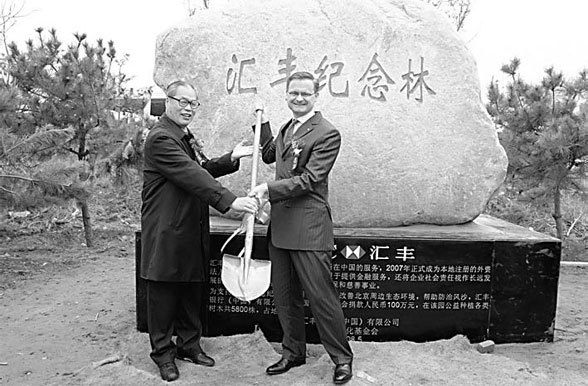In order to promote a healthier environment in Beijing for the summer Games and beyond, HSBC Bank (China) Company Limited (HSBC China) has donated 1 million yuan to the China Green Foundation to plant 5,800 trees at the Beijing Olympic Memorial Forest Park near the Badaling section of the Great Wall.

Wang Zhibao (left), chairman of China Green Foundation, presents a shovel to Richard Yorke, HSBC China president and CEO, at the Beijing Olympic Memorial Forest Park on May 12. HSBC China is one of the first international companies to commit to the China page of the UNEP's "Plant for the Planet: Billion Tree Campaign".
The trees, which are intended to help ward off sandstorms in the capital city, are part of a broader United Nations Environment Program (UNEP) initiative, "Plant for the Planet: Billion Tree Campaign," which seeks to help reduce carbon-dioxide emissions and the impact of global climate change.
The UNEP's one billion tree program, the brainchild of 2004 Nobel Peace Prize laureate Wangari Maathai of Kenya, encourages people, communities, businesses and governments to annually plant at least 1 billion trees worldwide to help reverse the trend of climate change.
HSBC's support of the program is a further addition to the bank's already considerable investment in China environmental projects. Richard Yorke, president and chief executive officer of HSBC China, spoke with China Business Weekly about the bank's commitment to the environment and why he sees it as good business.
Q: What can you tell us about HSBC's support for the Billion Tree Campaign?
A: HSBC chose to support the campaign in China as it dovetails with our existing environmental commitments and projects. We have been extensively involved in environmental protection in China over the years by co-operating with government departments such as the State Forestry Administration, environmental organizations and universities in a wide range of projects, including wetland conservation, tree planting, urban greening and training for sustainable development.
I was particularly happy to see our staff volunteers and representatives from the Green Union of Beijing universities who joined us in tree-planting in the Beijing Olympic Memorial Forest Park last Monday when HSBC China announced our commitment to the "Billion Tree Campaign". Their participation shows the wider appeal of this campaign which is led by China Green Foundation, and is also very much in line with HSBC's philosophy of encouraging broad engagement in environmental protection and education about climate change.
Q: HSBC in December announced details on its climate partnership. Is the tree planting part of that initiative?
A: Our investment in the Beijing Olympic Memorial Forest Park is separate from and in addition to the HSBC Climate Partnership, which is a $100 million program we are engaged in with global conservancy group WWF, the Earthwatch Institute, The Climate Group and the Smithsonian Tropical Research Institute. China is a key focus of the HSBC Climate Partnership. The China component of the Climate Partnership was launched in December last year, with HSBC investing $21.7 million to help tackle climate change in China.
For instance, under the partnership, HSBC is funding studies in Beijing, Shanghai and the Pan-Pearl River Delta region on models of energy-efficient cities, and improving the resilience and adaptability of the ecological system in delta regions to climate change. Involving staff is also a key feature of this program. This year, six HSBC China staff volunteers will join Earthwatch for a two-week field research and when they come back, they will become HSBC Climate Champions and contribute to the energy-conservation and emission-reduction activities in their own workplace and communities.
Q: What is HSBC's view on carbon neutrality? Are you carbon neutral in China?
A: HSBC was the first international financial institution to become carbon neutral in October 2005.
HSBC's carbon neutrality plan consists of three parts: firstly, to manage and reduce our direct emissions; secondly, to reduce the carbon intensity of the electricity we use by buying "green electricity"; and thirdly, to offset the remaining emissions in order to achieve carbon neutrality.
As a member of the HSBC Group, HSBC China contributes to the Group's carbon neutrality. In China, we uphold the Group's carbon-neutrality policy in our own operations. A series of environmental policies have been implemented throughout our offices and branches. For example, we have equipped our network with video and teleconferencing facilities to reduce the need for business travel, and installed duplex printers in office to reduce paper use.
Q: How effective is tree planting as a method of curbing greenhouse gasses?
A: There is some debate about the effectiveness of tree planting as a means of reducing carbon dioxide emissions. Specifically, there are concerns that trees trap CO2 emissions but will release them at a later date if they are burned or as they decompose.
Sufficient and professional maintenance is necessary to ensure the trees grow well.
It is also important that suitable trees are selected for different environment. The 5,800 trees HSBC planted in Beijing Olympic Memorial Forest Park were well mixed.
We not only plant trees but where possible seek to sponsor the care of natural resources. In Shanghai, for instance we sponsor the care of a community park of 20,000 square meters and nearby wetlands measuring 10,000 square meters.
Beyond any contribution to the efforts against climate change, these projects have other benefits for people - including reduced urban pollution and urban temperatures in the case of urban parks and a home for rare migratory birds in relation to the wetlands.
For the Beijing Olympic Memorial Forest Park an added benefit is that the green band surrounding Beijing will help reduce sandstorms.
(China Daily May 19, 2008)